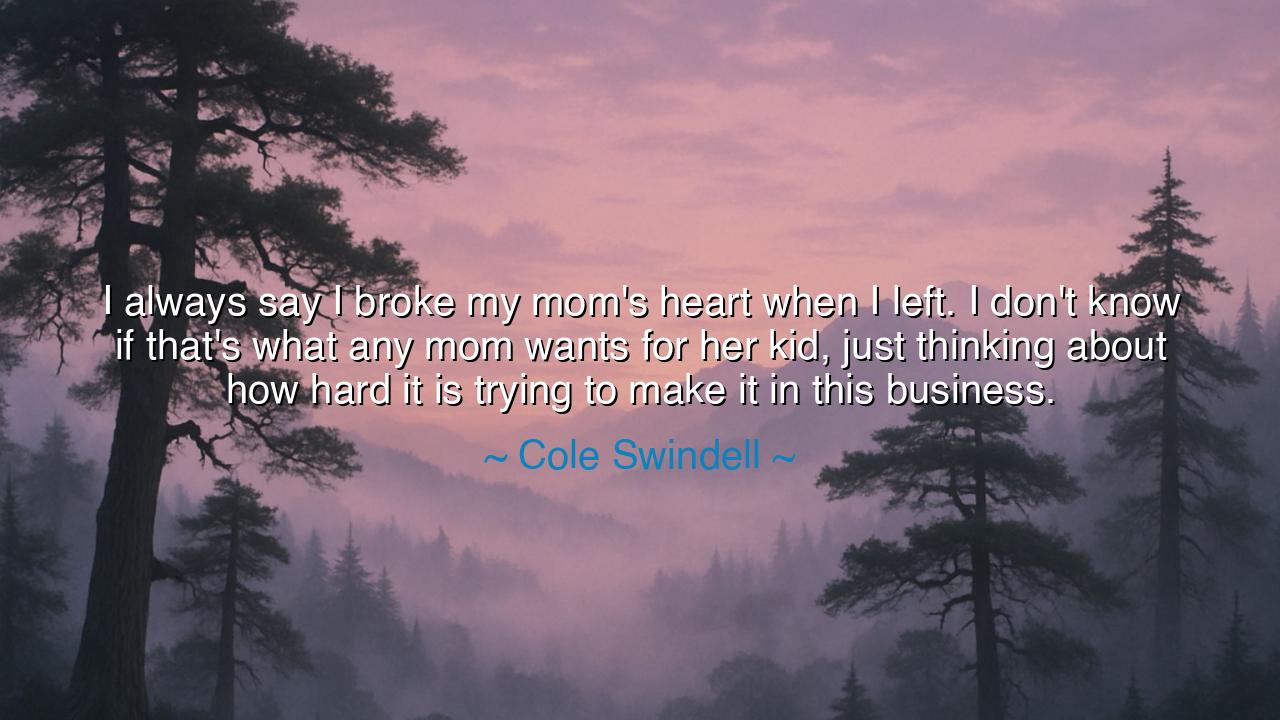
I always say I broke my mom's heart when I left. I don't know if
I always say I broke my mom's heart when I left. I don't know if that's what any mom wants for her kid, just thinking about how hard it is trying to make it in this business.






Cole Swindell once revealed a truth wrapped in sorrow and love, saying: “I always say I broke my mom’s heart when I left. I don’t know if that’s what any mom wants for her kid, just thinking about how hard it is trying to make it in this business.” These words are more than a personal confession—they are the song of countless children who leave the warmth of home to chase a dream, and of countless mothers who let them go, even as their hearts are torn in two.
From the beginning of time, this story has repeated itself. Sons and daughters, stirred by destiny, have departed from the embrace of family to pursue their path, whether it be in war, in art, in pilgrimage, or in craft. The mother’s heart, ever a place of shelter, knows both pride and grief in such moments. Pride, because her child is bold enough to seek their own way. Grief, because love wishes to protect even when it cannot. In Swindell’s words we hear this eternal tension—the ache of departure and the fear of struggle.
Consider the tale of Christopher Columbus, who left the shores of Genoa to sail into the unknown seas. His mother, like many before her, must have felt the same breaking of heart, knowing that he risked not only hardship but the jaws of death. And yet, without that painful leaving, new worlds would never have been revealed. History is filled with such examples: children stepping into hardship while mothers, silent in their sacrifice, remain behind, carrying the weight of worry in their chests.
Swindell speaks, too, of the business—the world of music, unpredictable and unforgiving. Every stage, every audition, every rejection can feel like a storm against the soul. For a mother, to watch her child step into such a struggle is agony, for all she desires is safety, stability, peace. But the child knows: the greater the risk, the greater the chance of becoming who they are meant to be. The mother’s broken heart is the price of the child’s rising.
Yet we must remember: a heart that breaks in love also expands in pride. The very pain that a mother feels at her child’s leaving is born from the depth of her devotion. It is proof of unyielding love, not weakness. When the child succeeds, when they carve their place in the world, that brokenness is healed with joy, and the sacrifice gains its meaning. The journey, hard as it is, brings honor to both the dreamer and the one who first nurtured the dreamer’s life.
The lesson here is both tender and fierce: to chase a calling often requires leaving behind comfort, and that leaving will wound those who love us most. But wounds born of love are not wasted. We must honor those sacrifices by working with all our might, by refusing to let the struggle defeat us. The child must carry both their own ambition and the weight of the mother’s broken heart, turning it into fuel to persevere.
Practical wisdom calls us to act: if you must leave, leave with gratitude. Speak your love openly. Carry the memory of your mother’s tears not as a burden, but as a compass reminding you of who you are and why you strive. When the world strikes you down, remember the silent strength of the one who let you go, and rise again. Let your success not only belong to you, but to her as well, for she paid the first price in love.
Thus Cole Swindell’s words remind us of a truth as old as time: that every great journey begins with a departure that hurts. The mother’s heart may break, but in that breaking it gives birth to courage. And so, in chasing our dreams, we must never forget the love that made us, nor the sacrifices that set us free.






AAdministratorAdministrator
Welcome, honored guests. Please leave a comment, we will respond soon